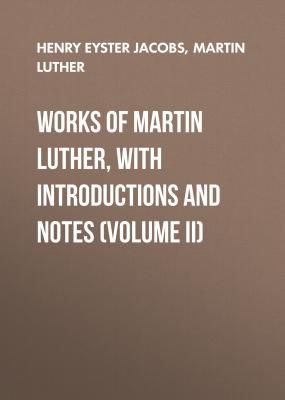Works of Martin Luther, with Introductions and Notes (Volume II). Martin Luther
Читать онлайн.| Название | Works of Martin Luther, with Introductions and Notes (Volume II) |
|---|---|
| Автор произведения | Martin Luther |
| Жанр | Философия |
| Серия | |
| Издательство | Философия |
| Год выпуска | 0 |
| isbn |
192
Certificates granting their possessor permission to eat milk, eggs, butter and cheese on fast days.
193
The word is used here in the broad sense, and means dispensations of all sorts, including those just mentioned, relating to penance.
194
Equivalent to "carrying coals to Newcastle."
195
The
196
A part of the Vatican palace notorious as the banqueting-hall of Alexander VI (1402-1503), turned by Julius II (1503-1513) into a museum for the housing of his wonderful and expensive collection of ancient works of art. Luther is hinting that the indulgence money has been spent on these objects rather than on the maintenance of the Church. Cf. Clemen, I, 384, note 15.
197
i. e., The offices and positions in Rome which were for sale. See Benrath, p. 88, note 18; p. 95, note 36.
198
See above, p. 84, note 1.
199
The passage is chapter 31,
200
See above, pp. 91 f.
201
See above, p. 91.
202
See above, p. 94.
203
i. e.. Promises to bestow on certain persons livings not yet vacant. Complaint of the evils arising out of the practice was continually heard from the year 1416. For the complaints made at Worms (1521), see Wrede,
204
See above, pp. 86 f.
205
See above, pp. 92 f.
206
See above, p. 93.
207
See above, p. 89.
208
Rules for the transaction of papal business, including such matters as appointments and the like. At Worms (1521) the Estates complain that these rules are made to the advantage of the "courtesans" and the disadvantage of the Germans. (Wrede,
209
The local Church authorities, here equivalent to "the bishops." On use of term see
210
The sign of the episcopal office; as regards archbishops, the
211
See above, p. 87, note 1.
212
The first of the ecumenical councils (A. D. 325). The decree to which Luther here refers is canon IV of that Council. Cf. Köhler,
213
The primate is the ranking archbishop of a country.
214
"Exemption" was the practice by which monastic houses were withdrawn from the jurisdiction of the bishops and made directly subject to the pope. The practice seems to have originated in the X Century with the famous monastery of Cluny (918), but it was almost universal in the case of the houses of the mendicant orders. The bishops made it a constant subject of complaint, and the Lateran Council (Dec. 19, 1516) passed a decree abolishing all monastic exemptions, though the decree does not seem to have been effective. See
215
The papal interference in the conduct of the local Church courts was as flagrant as in the appointments, of which Luther has heretofore spoken. At Worms (1521) it was complained that cases were cited to Rome as a court of first instance, and the demand was made that a regular course of appeals should be re-established. Wrede,
216
The reference is Canon V of the Council of Sardica (A. D. 343), incorporated in the canon law as a canon of Nicaea (
217
i. e., Appealed to Rome for decision. This is the subject of the first of the 102
218
The judges in the bishops' courts. The complaint is that they interfere with the administration of justice by citing into their courts cases which properly belong in the lay courts, and enforce their verdicts (usually fines) by means of ecclesiastical censures. The charges against these courts are specified in the
219
The
220
See above, pp. 88 f.
221
See above, p. 88, note 3.
222
See above, p. 94.
223
i. e., The cases in which a priest was forbidden to give absolution. The reference here is to cases in which only the pope could absolve. Cf.
224
A papal bull published annually at Rome on Holy Thursday. It was directed against heretics, but to the condemnation of the heretics and their heresies was added a list of offences which could receive absolution only from the pope, or by his authorisation. In 1522 Luther translated this bull into German as a New Year present for the pope (
225
The breve is a papal decree, of equal authority with the bull, but differing from it in form, and usually dealing with matters of smaller importance.
226
Cf. Luther's earlier statement to the same effect in
227
See above, p. 99.
228
The Fifth Lateran Council (1512-17).
229
See above, p. 90, note 1.
230
In the canon law,
231
The induction of Church officials into office. The term was used particularly of the greater offices—those of bishop and abbot. These offices carried with them the enjoyment of certain incomes, and the possession of certain temporal powers. For this reason the right of investiture was a bone of contention between popes and emperors during the Middle Ages.
232
Especially in the time of the Emperors Henry IV and V (1056-1125).
233
The German Empire was regarded during the Middle Ages as a continuation of the Roman Empire. (See below, p. 153.) The right to crown an emperor was held to be the prerogative of the pope; until the pope bestowed the imperial crown, the emperor bore the title, "King of the Romans."
234
In the canon law,
235
In the treatise,
236
cf.
237
A
